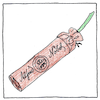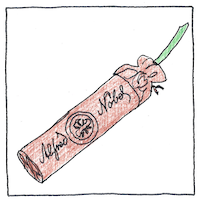Alfred Nobel
chemistry

|
Dynamite
A paste of nitroglycerin in a porous stone mash molded, wrapped in cardboard, and fitted with a fuse. Ubiquitous, it blasted hard rock mines and mountains, quarries, railroad cuttings, tunnels, helped extinguish the great San Francisco fire of 1906, and made Alfred B. Nobel rich, but failed to serve in the many cartoon schemes of Wile E. Coyote to capture the quick but inarticulate Roadrunner. A stick of dynamite was useful in many comic and dramatic scenes as its fuse burned shorter and shorter (our hero having lighted it instead of a candle). Go ahead and make fun of it; it was popular because it was powerful but it didn’t explode unless you wanted it to, which probably has little bearing on our use of the word as a form of praise blurted out like a little explosion, and printed with an exclamation point at the end like a fuse.
Engines of invention
Alfred’s father worked for the Russians manufacturing submarine mines and torpedoes until the end of the Crimean War when the family returned to Sweden. There they set up a laboratory to experiment with nitroglycerin, which was no doubt Alfred’s idea. Alfred worked even harder to invent a safe way to handle the powerful but volitile explosive, even more insanely devoted to the problem, after this laboratory exploded killing his younger brother Emil Adolfe.
Engines of war
Alfred was accused of improving the engines of war, but he thought that his explosives would lead to peace because they made war more horrible. Obviously he underestimated the human capacity to suffer and to inflict suffering, and it’s ironic that many later repeated the same argument to support the deployment of nuclear bombs.



Alfred Nobel’s motivations are more admirable than his legacy, not counting his money for funding annual prizes. His explosives did not lead to peace. I am not sympathetic to the assertion that availabilty of the weapon is not to blame. You give an angry man a gun and he can hurt someone; give him a wet noodle and he can hurt fewer people. With or without Nobel’s inventions, we would continue to fight wars, but they helped killed more people sooner.
See also in The book of science:
Readings in wikipedia: